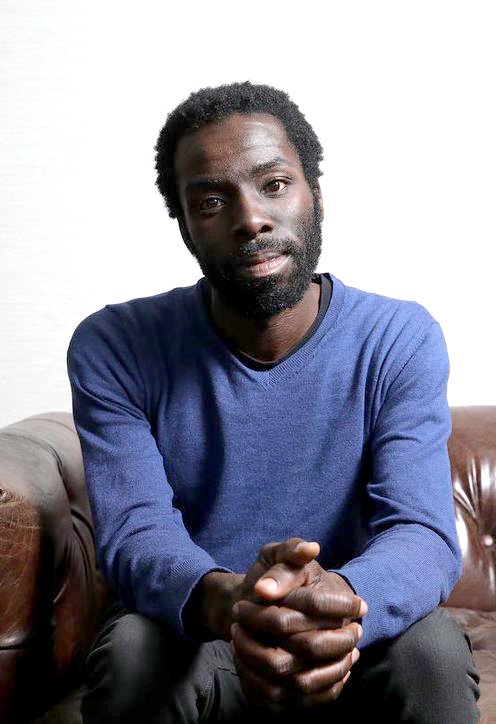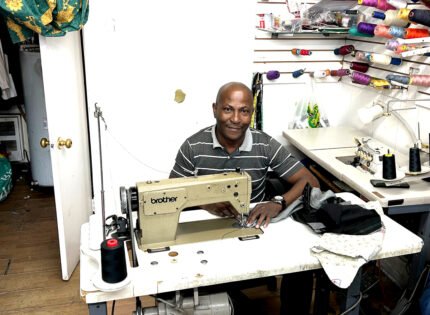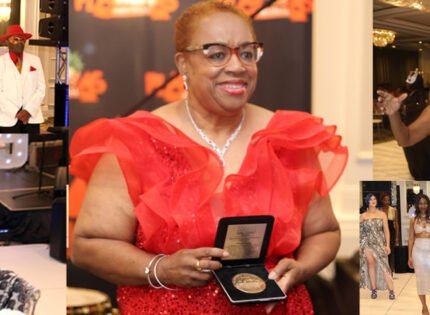The Skin We’re In: A Year of Black Resistance and Power. Doubleday Canada, 2020. Nonfiction. 246 pages.
H. Nigel Thomas


On the evening of February 12, 2020, I hurried from a talk I’d just delivered to Amnistie international to the bookstore Drawn and Quarterly, hoping to hear most of what Desmond Cole had to say about his book The Skin We’re In: A year of Black Resistance and Power. I think I heard about half of the answers he gave to Emily Nicholas, who was interviewing him.
I was glad that I made the trip. Hearing Cole talk about the issues that motivated his writing of the book was, for me, an added incentive to buy it. I was already aware of Cole’s seminal role in exposing the Toronto police practice of carding; i.e., the arbitrary and frequent stopping of non-Whites and collecting data on them. I had also seen Cole in Charles Officer’s documentary The Skin We’re In. The film, in which Cole is the central narrator and character, deals with the issues of racial injustice that are the subject of Cole’s book.
I put The Skin We’re In alongside Robyn Maynard’s Policing Black Lives and Cecil Foster’s They Call Me George. Each of these books documents the Black Canadian struggle for basic justice and equality. Both Cole and Foster do so with ample storytelling. In Cole’s case much of the storytelling is about his personal involvement, along with others, in the struggle to hold the police, city councillors, school board officials, citizenship and immigration officials, the organizers of Toronto Pride, and Black politicians and policy wonks—including federal minister of immigration Ahmed Hussen—accountable.
Each chapter of Cole’s book is titled after a month of the year 2017, a structural device for which he credits Dionne Brand. For the most part, each chapter prises one or more atrocities, usually committed by the police, mostly a killing or a maiming, and tells the stories of those whose lives have been devasted by what often seems like trigger-happy sadistic police officers. But just as important is the community’s unflagging will to obtain justice and to put an end to such arbitrary and wanton killing.
When necessary, Cole links this central story to similar stories before. There is a chapter on the police presence in Ontario schools, the nefarious reasons for the policy, and the battle to end it. Another chapter deals in depth with what I could only call Canada’s pro-European immigration policy (which Foster also explores at length), the measures put in place to keep out mainly black and brown peoples, and the grievous and seemingly illogical policy of deporting adults who’ve lived in Canada since infancy.
Cole also examines how successful Blacks could be manipulated into serving the racist system. His analysis lays bare the schisms that exist between those who ally themselves with power and in so doing become inadvertent apologists for an unjust system. Implicitly, for Cole, meaningful Black organizations should be engaged in activities that make a difference in the lives of Blacks.
He lays bare a dilemma in the Black communities: Do we or do we not enter into politics? The adage holds true that in this capitalist society if you are not at the table, you are on it. It was true in 1885 when Europe carved up Africa and it is still true today. But entering into the system often means that we are complicit in our people’s oppression.
Austin Clarke told me that he’d joined the Conservative Party hoping to change it but had to get out before it changed him. Nowhere is this more evident than in Ahmed Hussen’s portfolio. He is the minister of an immigration system that is structured to keep Black immigration to a trickle. Yet there’s validity in the argument that our presence at the table lessens the damage.
Because of its storytelling with aptly described settings and well-crafted conversational prose, The Skin We Are in is a literary jewel. Its circular structure, the solar year, symbolically embodies the perennial nature of Black oppression in Canada—one might say, from Olivier Le Jeune (1634) to early Birchtown to beyond Hogtown (I can think of the police killings in the 1980s: Albert Johnson, Macellus François, Anthony Griffin . . . the list is long). The subtle literary quality of the text imbues it with a captivating emotional power. I advise everyone to get a copy, read it, and lend it to anyone who might not be able to afford a copy.















